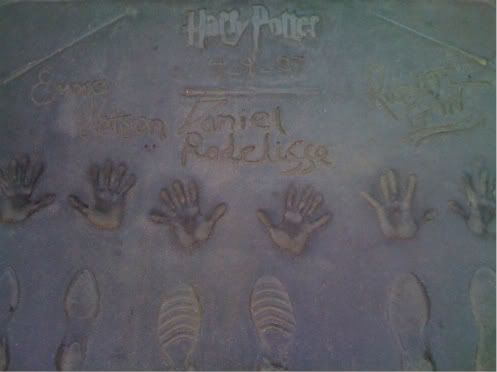Mudblood, and Proud of It
Feb 20, 2010
Bloggers - Jon
First off, I took that walk down to
see the Hand, Foot, and Wand prints and I wanted to share the picture I
snapped. A note to anyone going to
visit, the trio’s prints are front and center.
I wandered around thinking the newer ones would be on the edges, but
they really had a place of honor!
Anyway, it was really cool, definitely worth a stop if you’re coming to
LA.

–WARNING: The following blog, including its comments section, contains some strong language (slurs). As always, it is used within the context of an analytical discussion.–
When I was a junior in high school,
I took a Sociology class. The resident
loopy Spanish teacher taught the class and unfortunately, she didn’t really
know that much about Sociology, so we ended up doing a lot of activities that
never really came around to a real point.
We were doing a unit on prejudice, and our teacher asked everyone to go
up to the chalkboard and write every racial slur we could think up. After about ten minutes, the entire
wall-to-wall board was so full we had to use the one on the sidewall. I remember she had to add a couple at the end
that no one was gutsy enough to write. My
school was predominantly white and everyone, including myself, was hesitant to
admit we knew all these words and write them in our classroom, even with
something as erasable as chalk. Still to
this day, when I help one of my filmmaking friends with his scripts, and I need
to quote a line with the “n” word in it, I bleep it out, like a song on the
radio. Even in quoting, it just feels
wrong.
Speaking
with my new roommate a few days ago, we were talking about my job search, and I
told him about my upcoming meeting with the Transgender Economic Empowerment
Program at the LA Gay and Lesbian Center, however, when I said it, I called it
the “center for queers.” I didn’t like
saying “gay and lesbian” because that language is, to me, a little
old-fashioned. “Gay and lesbian” aren’t
really all-encompassing terms either, and though I imagine when the center
started, that was probably enough, with the culture of LGBTQâ‚‚ (Lesbian, gay,
bisexual, transgender, queer, and questioning), it seems lacking. The name of the center is not some big issue
for me, but all the same, I prefer to use my little nickname for it. When I said this phrase to my roommate
though, a straight male, he told me that seemed wrong and he didn’t want to
call it that; he was under the
impression that “queer” was still a derogatory term. I told him that my friends and I always
referred to ourselves as a bunch of “queers’ “fags’ “dykes.” I discussed this interaction with the woman
at the center. She wisely pointed out
that while there was still a good amount of stigma with the “queer” label for
the older generation and the public, the younger generation had clearly embraced
it as their own and used it as a tool for empowering our community. This is true, and indeed I would even
hesitate to use it around anyone 15 years older than myself, but my friends and
I, we own it.
In Chamber of Secrets, we are introduced to
the term “Mudblood.” The word is so
offensive that Fred and George charge Malfoy and Ron casts the Slug spell that
backfires. He explains the term later,
saying with disgust, “Dirty blood¦Common blood.
It’s mad.” This was, of course,
also the word that drove the fatal dagger through the heart of Lily and Snape’s
friendship. It was proof of a solidified
thought, and something that had been there all along, just below the surface. And that’s what all slurs are. They are one group’s belief in its
superiority over another. They are the
labeling of hatred.
In Deathly Hallows, after years of being
called “Mudblood Granger’ Hermione chooses to embrace the phrase. The trio is speaking with Griphook and the
discussion turns to the marginalization of goblins under Voldemort’s new regime,
but Hermione tells him that goblins, Mudbloods, house-elves, were all in the
same boat now. Ron is outraged at this,
“Don’t call yourself that!” But she counters, asking “Why shouldn’t I? Mudblood, and proud of it! I’ve got no higher position under this new
order than you have, Griphook! It was me
they chose to torture, back at the Malfoys’!”
Hermione goes through five years
of being abused and hurt by this phrase and then, at the height of the war,
when she has physically and tangibly suffered for her “dirty blood’ she adopts
it as her own.
You just get to a point with these
things. For years, idiots yell “fag”
across the street at you and you don’t even react. You convince yourself it’s just “their problem” and you
don’t let it affect you. But the more
you learn about how organized the opposition is, how much the government
supports their arcane ways of thinking, the harder it gets to ignore, and you get angry. And so you are that “fag.” You accept
that you’ve been labeled and you look around and see who else they’ve stuffed
into the corner with you, and while you’re all standing there, you get to
talking, you share stories and you figure out how to get out of the corner,
together. Because it is one of the
funniest little twists that results from hate like that, it often inspires
love. My sister called me a “fruity
transman” the other day and my heart just swelled up with love for her, of its
own accord, because she was celebrating something others would easily cut me
down for. And it was nice, to be just a couple of
queers, talking on the phone, celebrating.


